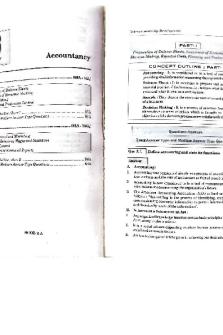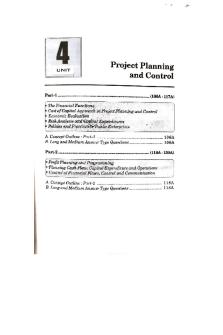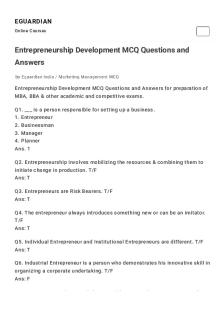Syllabus of Entrepreneurship Development PDF

| Title | Syllabus of Entrepreneurship Development |
|---|---|
| Author | yash gandhi |
| Course | Entrepreneurship Development |
| Institution | Delhi Technological University |
| Pages | 4 |
| File Size | 143.1 KB |
| File Type | |
| Total Downloads | 93 |
| Total Views | 170 |
Summary
Syllabus of Entrepreneurship Development...
Description
V SEMESTER SYLLABUS MANAGEMENT AND ENTREPRENEURSHIP Course Code: 18HS5ICMEP L: P: T: S: 3: 0: 0: 0 Exam Hours: 03 Total Hours: 40
Credits: 03 CIE Marks: 50 SEE Marks: 50
COURSE OBJECTIVES: 1. Understand the underlying principles of management. 2. To analyze and identify the functions of entrepreneurial activities and its prerequisites under practical conditions. 3. To develop and enhance one’s decision making skills amidst competitive business market. Course Outcomes: After completion of the course, the graduates will be able to MANAGEMENT & ENTREPRENEURSHIP CO14. Apply the principles of management in business activities. CO25. Use the managerial and entrepreneurial qualities & skills under real world condition. CO3
Analyze the functions of Management & Entrepreneurship and apply those in practical situations.
CO46. Identify various schemes provided by government of India to support business enterprise. CO57. Develop leadership skills to build a small scale industry. CO68. Develop entrepreneurial personality, able to prepare project report and initiate SSI. Mapping of Course outcomes to Program outcomes: PO 1
PO 2
PO 3
PO 4
PO 5
PO 6
PO 7
PO 8
PO 9
PO1 0
PO1 1
PO1 2
CO1
-
-
-
-
-
3
3
2
2
-
-
-
CO2
-
-
-
-
-
3
3
2
2
-
-
-
CO3
-
-
-
-
-
3
3
2
2
-
-
-
CO4
-
-
-
-
-
3
3
2
2
-
2
-
CO5
-
-
-
-
-
3
3
2
2
-
2
-
CO6
-
-
-
-
-
3
3
2
2
-
2
-
Unit
Course Content
Hours
COs
1
MANAGEMENT: Introduction – Meaning – nature and characteristics of Management, Scope and Functional areas of management – Management as a science, art and profession – Management & Administration – Roles of Management, Levels of Management. PLANNING: Nature, importance and purpose of planning process –Objectives – Types of plans.
06
CO1 CO2
2
ORGANIZING AND STAFFING: Nature and purpose of organization –Principles of organization – types of organization – Departmentation –Committees-Centralization Vs Decentralization of authority and responsibility – Span of control – MBO and MBE (Meaning Only) Nature and importance of staffing. (Case studies discussion)
10
CO1 CO2
3
DIRECTING & CONTROLLING: Meaning and nature of directing –Leadership styles, Motivation (Definition),characteristics, motivational theories (Maslow’s theory, theory ‘X’ and ‘Y’), Meaning and steps in controlling – Essentials of a sound control system – Methods of establishing control (in brief).
06
CO3 CO4
4
ENTREPRENEUR: Meaning of Entrepreneur; Evolution of the Concept, Functions of an Entrepreneur, Types of Entrepreneur, and Entrepreneur – an emerging Class. Stages in entrepreneurial process; Role of entrepreneurs in Economic Development; Entrepreneurship – its Barriers, EDP and its objectives (Case studies discussion, role play / group discussion)
08
CO3 CO4
5
SMALL SCALE INDUSTRY: Definition; Characteristics; Objectives; Scope; role of SSI in Economic Development. Advantages of SSI, Steps to start an SSI, Impact of Liberalization, Privatization, Globalization on S.S.I, Effect of WTO/GATT. Overview of detailed project report/profile.
10
CO5 CO6
Startup India: Benefits, Policies. Action plan- simplification and Handholding, Funding Support and incentives, Industry-Academia Partnership and Incubation. Salient features of Karnataka Startup Policy 2015-2020, Strategies encouraging entrepreneurship through NAIN. Venture capitalist, SSI funding schemes by banks and financial institutions, Government of India Initiatives on Thrust Areas, (Related case studies, supporting videos)
SELF-STUDY COMPONENT: Preparation of Project report/Profile Note: 1. At the end of the course students should have cultivated the ability to prepare project profile based on their selected business idea. 2. One Credit is allocated to project profile prepared by students. 3. Project profile/report shall be submitted before the end of the course. Contents /Structure of project report/profile: 1. Introduction 2. Market potential 3. Basis and pre assumptions 4. Implementation schedule 5. Technical aspects 6. Financial aspects and analysis 8. Details of machinery and equipment/ service suppliers TEXT BOOKS: 1. Principles of Management – P.C.Tripathi, P.N.Reddy – Tata McGraw Hill. 2. Dynamics of Entrepreneurial Development & Management – Vasant Desai – Himalaya Publishing House. 3. Entrepreneurship Development – Poornima.M.Charantimath – Small Business Enterprises – Pearson Education – 2006 (2 & 4). 4. Management & Entrepreneurship-N V R Naidu, IK International, 2008 REFERENCE BOOKS: 1 Management Fundamentals – Concepts, Application, Skill Development – Robers Lusier – Thomson. 2. Entrepreneurship Development – S.S.Khanka – S.Chand & Co. 3. Management – Stephen Robbins – Pearson Education/PHI – 17th Edition, 2003. 4. http://www.startupindia.gov.in/ 5. http://startup.karnataka.gov.in/docs/Startup_Policy_Karnataka.pdf Assessment Pattern: CIE –Continuous Internal Evaluation Theory (50 Marks) Bloom’s Category Tests
Preparation of Project Report/ Profile
Marks (Out of 50)
30
20
Remember
--
02
Understand
10
02
Apply
10
04
Analyze
05
04
Evaluate
05
03
Create
05
SEE –Semester End Examination Theory (50 Marks) Bloom’s Category
Marks Theory(50)
Remember
10
Understand
10
Apply
10
Analyze
10
Evaluate
10
Create...
Similar Free PDFs

Entrepreneurship-Development
- 15 Pages

ENTREPRENEURSHIP DEVELOPMENT
- 71 Pages

MBA 207 Entrepreneurship Development
- 12 Pages

Characteristics OF Entrepreneurship
- 57 Pages
Popular Institutions
- Tinajero National High School - Annex
- Politeknik Caltex Riau
- Yokohama City University
- SGT University
- University of Al-Qadisiyah
- Divine Word College of Vigan
- Techniek College Rotterdam
- Universidade de Santiago
- Universiti Teknologi MARA Cawangan Johor Kampus Pasir Gudang
- Poltekkes Kemenkes Yogyakarta
- Baguio City National High School
- Colegio san marcos
- preparatoria uno
- Centro de Bachillerato Tecnológico Industrial y de Servicios No. 107
- Dalian Maritime University
- Quang Trung Secondary School
- Colegio Tecnológico en Informática
- Corporación Regional de Educación Superior
- Grupo CEDVA
- Dar Al Uloom University
- Centro de Estudios Preuniversitarios de la Universidad Nacional de Ingeniería
- 上智大学
- Aakash International School, Nuna Majara
- San Felipe Neri Catholic School
- Kang Chiao International School - New Taipei City
- Misamis Occidental National High School
- Institución Educativa Escuela Normal Juan Ladrilleros
- Kolehiyo ng Pantukan
- Batanes State College
- Instituto Continental
- Sekolah Menengah Kejuruan Kesehatan Kaltara (Tarakan)
- Colegio de La Inmaculada Concepcion - Cebu











